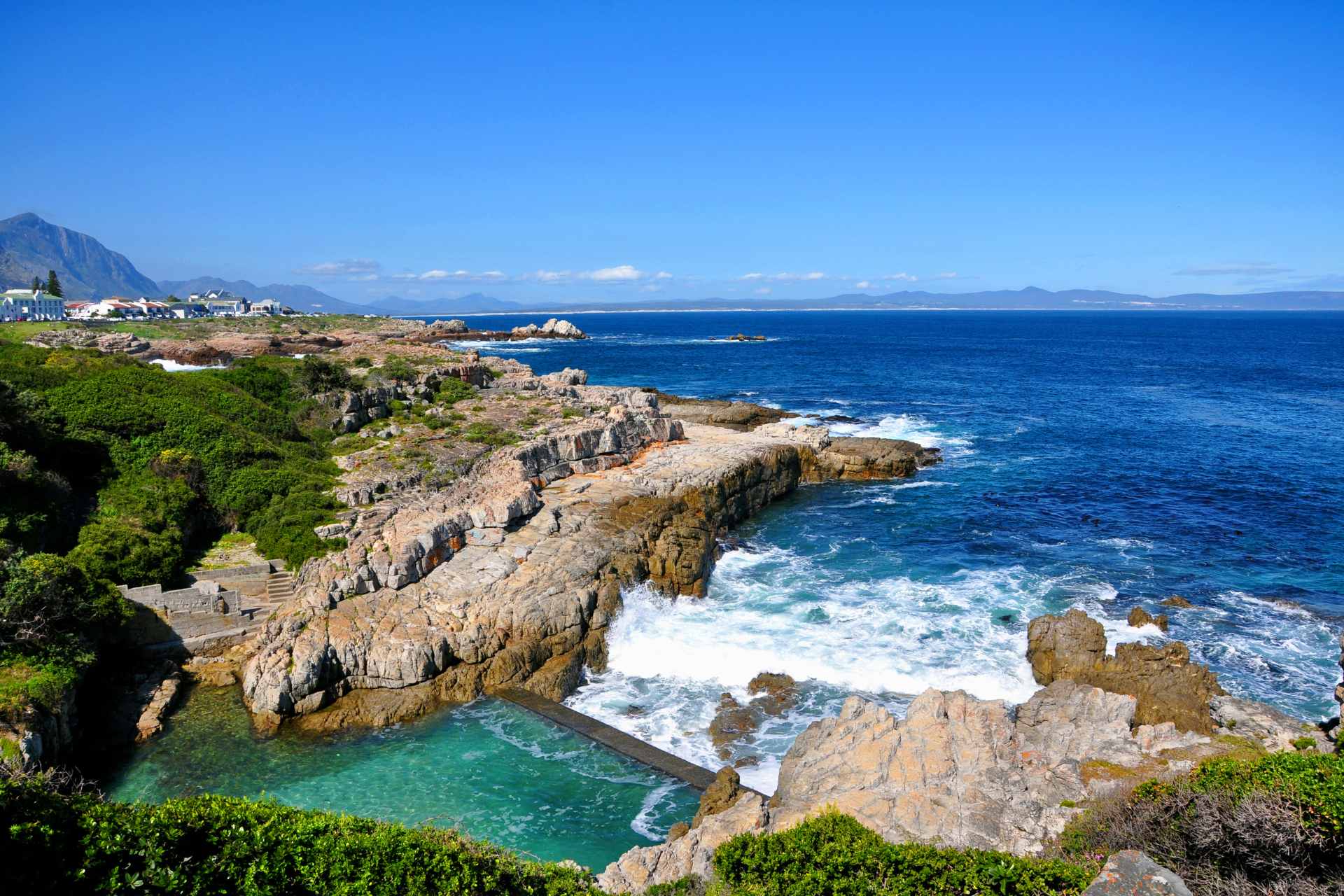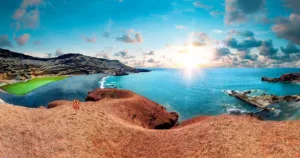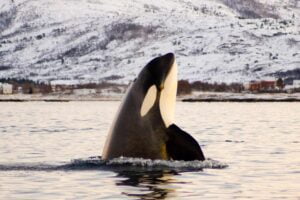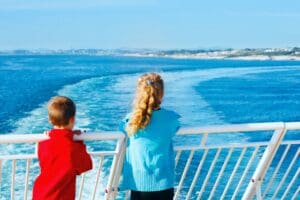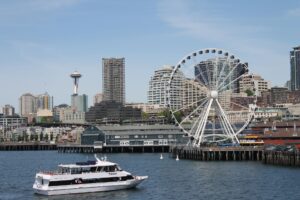The Best Spots for Whale Watching in South Africa: Top Locations Revealed
South Africa is renowned for its exceptional whale watching, granting you the unique opportunity to witness these majestic creatures in their natural habitat. Extensive coastline offers various vantage points for whale watching in South Africa, from where you can observe whales as they migrate, breach, and play in the waves. Your chances of spotting whales are highly dependent on the time of year, with the whale watching season typically stretching from June to November. This season aligns with the migration patterns of whales, making it the prime time for enthusiasts to visit.

Coastal towns like Hermanus have gained international acclaim as some of the best land-based whale-watching spots worldwide, with the town even hosting an annual whale festival that celebrates these ocean giants. Boat-based tours can provide a closer view and are available along the coast, including in the Western Cape, where operators are adept at offering sustainable and respectful wildlife encounters. South Africa’s Marine Protected Areas, such as Table Mountain National Park and De Hoop Nature Reserve, are some of the crucial regions that offer safe havens for whales and present ideal spots for you to appreciate these marine mammals.
Apart from the popular Southern Right Whales that are often the stars of whale watching shows, the South African coastline is also frequented by Humpback Whales and Bryde’s Whales, diversifying your potential sightings.
Each species offers a different experience; the Southern Rights are known for their leisurely pace and proximity to the shore, while Humpbacks display awe-inspiring acrobatics that can be seen during boat-based whale-watching tours. Your excursion into the world of whales in South Africa promises to be both thrilling and enlightening as you gain insight into the lives of these ocean wanderers.
Best Whale watching Tours in South Africa
What Makes South Africa a Premier Whale-Watching Destination
South Africa’s vast coastline and diverse marine ecosystems make it an unmatched locale for whale watching. Here, you can witness the majestic southern right whale and the acrobatic humpback whale, among other species, in their natural habitats.
Rich Marine Biodiversity
South Africa’s oceans are teeming with life, boasting nearly thirty different species of whales and dolphins. Marine life includes iconic whales, a variety of dolphins, and other sea creatures that contribute to a rich, biologically diverse marine environment. This biodiversity means that when you set out to watch whales, you’re also likely to encounter a complex tapestry of aquatic species along the way.
Ideal Whale Habitats
The waters off the coast of South Africa offer perfect conditions for whale habitats. Southern right whales and humpback whales prefer these waters for breeding and calving due to their suitability in terms of temperature, depth, and abundance of food. Key viewing spots like Hermanus and the Garden Route are globally renowned for their whale-watching opportunities, with Hermanus being dubbed the whale-watching capital of South Africa. The coastline here provides sheltered bays and inlets that serve as ideal nursery grounds for the protection of young whales.
Types of Whales You Can Spot in South African Waters
South Africa’s coastlines offer you the opportunity to witness some of the most awe-inspiring marine mammals in their natural habitat. From the iconic southern right whale to the nimble humpback, your whale-watching experience is poised to be unforgettable.
The Majestic Southern Right Whale
Southern right whales are the gentle giants of South African waters. Typically seen from June to November, these whales frequent the coastal regions, with Hermanus being a prime spot for land-based viewing. These whales are easily recognized by their massive size and distinctive callosities on their heads.
The Acrobatic Humpback Whale
Humpback whales, known for their spectacular breaching behavior, grace South Africa’s coastline between May and December. They migrate annually from the Antarctic to warmer climates along the east coast, offering thrilling displays that are loved by whale watchers.
Other Marine Animals to Look For
While the focus may be on the colossal whales, don’t overlook the chance to spot orca and Bryde’s whales. Both species, although less commonly seen, share these fertile waters. Additionally, groups of playful dolphins frequently accompany your whale-watching excursions, adding to the rich tapestry of marine life. If you venture near the colonies on the Western Cape, you might also catch sight of charming penguins bobbing in the water or waddling onshore.
Top Whale Watching Spots in South Africa
South Africa offers you some of the world’s best locations for whale watching, where these majestic creatures can be observed in their natural habitat. From the famed coastal towns to hidden gems along the Eastern Coast, you’ll find a variety of spots to enjoy unforgettable whale encounters.
The Charm of Hermanus
Hermanus is often referred to as the whale-watching capital of South Africa. It’s located along the impressive Walker Bay, enabling you to spot southern right whales as they migrate to the warmer waters between June and December. For an immersive experience, visit Hermanus during the annual whale festival, which celebrates the return of the whales to this idyllic bay.
Scenic Garden Route
The Garden Route is not just about scenic drives and lush landscapes; it’s also a prime whale-watching destination. Plettenberg Bay serves as a key spot on this route, boasting an array of marine life, including whales, dolphins, and seals. Boat-based whale watching tours are a popular choice here to get up close with the ocean’s gentle giants.
The Untouched Wilderness of the Eastern Coast
Venture further along the Eastern Coast to the Eastern Cape, where Port Elizabeth offers a gateway to marine adventures. The waters here are home to dolphins and a variety of whale species year-round. In proximity, the De Hoop Nature Reserve provides a tranquil setting for land-based whale watching, particularly known for southern right whale sightings from the cliffs.
Optimal Time for Whale Watching
When planning your whale-watching adventure in South Africa, timing is crucial. You’ll want to align your visit with the peak whale-watching season to improve your chances of witnessing these majestic creatures.
Seasonal Patterns
Whale-watching season typically runs from June to November, peaking between July and October. During this period, the Southern Right whales are the most commonly observed as they migrate to the warmer waters off the South African coast for breeding and calving. Come earlier in the season, around May, and you might spot some Bryde’s whales, which are known to reside in these waters throughout the year.
Migratory Routes
The whales’ journey from the cold Antarctic waters to the comparatively balmier South African coastline is a remarkable event. The migratory routes bring the whales close to the shore, providing excellent viewing opportunities. The prime spots for witnessing this migration include the famous Hermanus, known for its cliff-top viewing, and Plettenberg Bay, where sightings of Humpback and Bryde’s whales are frequent.
Choosing Your Whale-Watching Experience
When selecting the perfect whale-watching experience in South Africa, you need to decide between being feet-dry on land or setting sail for a closer encounter. Your choice will depend on comfort, accessibility, and how you want to experience these majestic marine mammals.
Land-Based Observations
Pros: More accessible and often free of charge, land-based whale watching can be an extraordinary experience, particularly in Hermanus, known as one of the best whale-watching locations globally. You have the comfort of solid ground under your feet and plenty of amenities nearby.
- Locations: Hermanus; Plettenberg Bay’s Robberg Nature Reserve; Keurboomstrand.
- Best Time: June to December, when whales are breeding and calving close to the shore.
Cons: You’re limited to the whales coming near the coast, and your view may not be as intimate as from a boat.
Boat-Based Adventures
Pros: A boat-based adventure gets you close to the action, offering a greater chance of seeing the whales up close and personal. It’s thrilling and allows for a wider scope of exploration.
- Whale Watching Operator: Choose accredited operators who respect wildlife and safety guidelines.
- Trip Duration: Typically between 2 to 3 hours.
- What to Expect: Viewing whales such as humpbacks and southern rights, and with luck, dolphins too.
Cons: It can be pricey, and sea conditions are less predictable, which may not be suitable for everyone.
The Role of Whale Criers in Whale Watching
In the quaint town of Hermanus, a unique figure known as the whale crier plays a pivotal role in enhancing your whale-watching experience. The whale crier is responsible for alerting you and other visitors to the presence of whales, using a horn made from kelp to communicate these sightings.
Historically, the whale crier’s role was based on the practice of town criers making public announcements. In the context of Hermanus, which is recognized for its exceptional land-based whale watching opportunities, the whale crier’s job is to scan the waters and inform you by sounding the horn when whales are spotted.
The sound of the horn varies to indicate different messages:
- One blow signals a whale sighting in the bay.
- Two blows suggest the whales are near the old harbor.
- Three blows indicate the presence of whales near the new harbor.
Your experience in Hermanus is not just about watching these majestic creatures; it’s about becoming part of a community that respects and celebrates marine life. The whale crier exemplifies this, offering a bridge between nature’s wonders and human observers.
While you explore the town, you’re likely to see the crier donning a sandwich board, which offers additional information on sightings and points of interest. This traditional yet effective method of communication ensures that you won’t miss an opportunity to witness the beauty of these marine giants and is an integral part of the whale-watching culture in Hermanus.
So, when you visit, keep your ears attuned to the distinctive call of the whale crier–it’s your direct line to the marine spectacle unfolding before your eyes.
Conservation Efforts and Sustainable Whale Watching
In South Africa, ensuring the protection of marine life while engaging in whale watching requires a balanced approach where conservation efforts align with the enjoyment and education of observers. Your awareness and actions can significantly contribute to the success of these initiatives.
Understanding the Importance of Conservation
Marine Conservation Status: The oceans are home to a diverse range of marine life, including various whale species whose conservation status ranges from least concern to critically endangered. Your understanding of the threats to these creatures, from habitat loss to climate changes, stresses the need for responsible whale watching.
Impact on Ecosystems: By prioritizing conservation, you contribute to protecting the intricate balance of marine ecosystems. Each whale plays a critical role in ocean health, like supporting fish populations and nutrient cycling, which ultimately benefits both marine life and human activities dependent on the sea.
Eco-Friendly Practices in Whale Watching
Regulated Approaches: In South Africa, sustainable whale watching is mandated through regulations that control the distance and interaction vessels may have with whales. These measures are designed to minimize stress on the animals and preserve their natural behaviors.
- Guidelines for Boats: Boats are required to maintain a specific distance from whales and reduce speed to avoid collisions, ensuring the safety of both whales and passengers.
- On-Board Education: Operators often provide educational briefings to emphasize the importance of conservation and inform passengers about the creatures they are observing.
Supporting Responsible Operators: As a whale-watching enthusiast, choosing operators committed to sustainable practices is within your power. Your patronage supports businesses that implement measures like propeller guards and waste management to protect whales and the ocean.
By actively participating in sustainable whale watching, you’re contributing to the conservation of these majestic creatures and the overall health of marine ecosystems. Your responsible choices encourage industry practices that respect the natural world while still allowing you to experience the awe-inspiring presence of whales.
Must-Visit Events: Celebrating Whales and Marine Life
When you’re eager to immerse yourself in the realm of marine wonders, South Africa’s whale festivals are a celebration you shouldn’t miss. Take part in the Hermanus Whale Festival, an annual event known for placing a spotlight on the environmental wonders of whales and other marine creatures. This family-friendly event is the perfect place to observe the majestic Southern Right Whales from the shore.
In addition to whale watching, you can engage in a variety of marine-themed activities designed for all ages. Educational talks, exhibitions, and workshops aim to raise awareness of ocean conservation, making your experience both enjoyable and enlightening.
Here’s a quick guide to what you can expect:
- Whale Watching: Prime spots along the coast with guided tours.
- Marine Exhibits: Interactive and educational displays on marine life.
- Craft Markets: Local artisans showcase marine-related crafts.
- Food Stalls: Local cuisine to keep you energized.
- Live Entertainment: Music and performances that capture the spirit of the sea.
Don’t forget to check the calendar for specific dates, as these events are usually timed to coincide with the peak whale migration season, ensuring the best possible sightings of these gentle giants. Your visit promises unforgettable sights and supports local conservation efforts to protect these magnificent creatures and their habitat.
Planning Your Trip: Itineraries and Best Practices
Embarking on a whale-watching adventure in South Africa requires thorough planning and consideration of key details. The following guidance will help you design an itinerary that maximizes your chances of a memorable encounter with marine life and provides you with practical tips to enhance your experience.
Creating a Comprehensive Itinerary
Your whale-watching journey should ideally begin in Cape Town, an essential starting point given its proximity to prominent whale-watching sites. From here, you can head to the famed waters of Hermanus in the Western Cape. Considered one of the world’s best whale-watching destinations, you might witness the majestic Southern Right whales from June to November.
Moving east along the coast, add Gansbaai to your itinerary for a chance to see whales and other marine creatures, such as dolphins and seals.
- Cape Town: 2 days for city exploration and nearby whale sighting points
- Hermanus: 3 days for whale watching from both shore and boat tours
- Gansbaai: 2 days for boat-based whale watching and possibly shark cage-diving
Remember to check the migratory patterns and local peak seasons to align your itinerary with the highest likelihood of sightings.
Travel Tips for the Whale-Watching Enthusiast
Preparation is crucial - make sure to book your whale-watching tours in advance, especially during peak season, as spots fill up quickly. Dress in warm layers as the sea breeze can be chilly, even in the South African spring and summer. Binoculars will be your best friend for shore-based watching, allowing you to spot whales from a distance.
Here are some specific tips for whale watchers:
- Choose responsible tour operators who respect wildlife and follow ethical guidelines.
- Stay hydrated and protected from the sun, as days out on the water can be long.
- Be patient; marine life is unpredictable, but waiting is often rewarded with breathtaking sightings.
By following these guidelines and planning carefully, your South African whale-watching trip will be both successful and respectful to the natural habitats you’ll be visiting.
Accommodations and Amenities near Whale Watching Sites
When planning your whale watching trip to South Africa, finding the right place to stay enhances your experience. Your choices range from luxury lodges to cozy bed-and-breakfasts.
In Hermanus, coined as the whale-watching capital of South Africa, you’ll find a variety of accommodation options to suit your preferences. You can choose a seaside hotel where you may spot whales right from your balcony or opt for a quaint inn that offers easy access to whale watching tours.
- Luxury Stay: For an upscale experience, consider staying at the Morukuru Beach Lodge, situated in the De Hoop Nature Reserve. This lodge combines elegance and nature, with ample opportunities to view whales from the shore.
- Moderate Options: Boutique hotels and guesthouses in the heart of Hermanus allow you to enjoy modern amenities within walking distance of various lookout points.
- Budget-Friendly: If you’re on a budget, hostels and B&Bs offer comfortable yet affordable accommodations.
Amenities to look for while booking your stay:
- Free Wi-Fi: Stay connected to share your incredible whale sightings instantly.
- Proximity to Whale Watching Sites: Select accommodations close to the coast for the best chances to witness these gentle giants.
- Tour Booking Services: Establishments that offer or assist with arranging whale-watching tours add convenience to your adventure.
- On-Site Dining: Choose a place with a restaurant or cafe for a relaxing meal after a day of whale watching.
Ensure to check guest reviews for personal experiences and additional insights on the accommodations you consider. Your stay in South Africa’s whale watching spots should be as unforgettable as the marine life you come to see.

